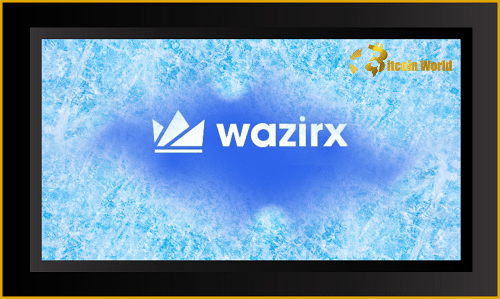The Indian crypto landscape is once again under the spotlight, and this time, it’s WazirX, one of the nation’s leading cryptocurrency exchanges, facing the heat. The Enforcement Directorate (ED) has taken significant action, freezing the exchange’s bank assets as part of an ongoing money laundering investigation. What exactly happened, and what does this mean for the future of crypto in India? Let’s break down the key developments.
The ED Action: Why Now?
The ED’s move comes after a thorough probe into alleged money laundering activities. Here’s the crux of the matter:
- The investigation suggests that WazirX may have inadvertently facilitated money laundering for organizations behind instant loan apps.
- These apps are accused of using the exchange to buy and sell virtual crypto assets, effectively moving illicit funds.
- The ED’s official statement on Twitter highlighted the freezing of ₹64.67 Crore in WazirX’s bank assets, stating it was for “assisting accused Instant Loan APP Companies in the laundering of fraud money via purchase & transfer of virtual crypto assets.”
What Did the ED Find During Their Searches?
According to reports, the ED conducted searches related to the Director of Zanmai Labs Pvt. Ltd, the company that owns WazirX. The agency has alleged a lack of cooperation during the investigation. This action is part of a broader inquiry into numerous Chinese loan apps operating within India.
This isn’t the first time WazirX has been on the ED’s radar. This action follows a previous notification served to the exchange under the Foreign Exchange Management Act (FEMA).
The Trail of Funds: Where Did the Money Go?
The ED’s investigation reportedly uncovered a significant diversion of funds by fintech companies. Here’s what they found:
- Funds were used to purchase crypto assets.
- These crypto assets were then allegedly laundered abroad.
- The ED states that both the companies involved and the virtual assets are currently untraceable.
The ED further pointed out that a substantial portion of these diverted funds flowed through the WazirX exchange, and the acquired crypto assets were subsequently transferred to unidentified foreign wallets.
KYC Norms and the Missing Crypto Assets: What’s the Connection?
The ED has raised serious concerns about WazirX’s operational practices, alleging that these shortcomings contributed to the difficulty in tracing the missing crypto assets. Key points of contention include:
- **Remote Access and Lack of Information:** Despite having complete remote access to the WazirX database, Sameer Mhatre, Director of WazirX, is accused of not providing transaction details related to crypto assets acquired with the proceeds of the alleged loan app fraud.
- **Lax KYC Norms:** The ED alleges that WazirX’s Know Your Customer (KYC) procedures were not stringent enough.
- **Loose Regulatory Control:** Concerns have been raised about the regulatory oversight of transactions between WazirX and Binance.
- **Transaction Recording:** The ED claims that WazirX did not record transactions on blockchains to save costs and failed to record the KYC information of counterpart wallets.
According to the ED, these factors have collectively made it impossible for WazirX to account for the missing crypto assets.
WazirX and Binance: A Difference in Perspective?
There appears to be a discrepancy in how WazirX and Binance view their operational relationship. Here’s a timeline of their statements:
- **Earlier Claims:** Nischal Shetty, a co-founder of WazirX, previously stated that WazirX controlled all crypto-to-crypto and INR-to-crypto transactions, indicating a preferential agreement with Binance.
- **Recent Stance:** Zanmai Labs now claims their involvement is limited to INR-to-crypto transactions, suggesting that Binance handles all other types of transactions on the WazirX platform.
This shift in narrative adds another layer of complexity to the ongoing investigation.
Historical Data and Due Diligence: What Was Lacking?
Adding to the ED’s concerns, WazirX has stated that it did not maintain records of the bank account details used for deposits into the exchange for cryptocurrency purchases before July 2020.
Furthermore, the ED’s findings highlight several alleged shortcomings in WazirX’s due diligence processes:
- No physical address verification was conducted.
- The sources of clients’ funds were not scrutinized.
- Enhanced Due Diligence (EDD) was not implemented.
- Suspicious Transaction Reports (STRs) were allegedly not triggered when necessary.
The Outcome: Asset Freeze Under PMLA
As a direct consequence of these findings, the ED has frozen WazirX’s assets under the Prevention of Money Laundering Act (PMLA). This signifies the seriousness of the allegations and the potential legal ramifications for the exchange.
What Does This Mean for the Future of Crypto in India?
The ED’s action against WazirX underscores the increasing regulatory scrutiny facing the cryptocurrency industry in India. Here are some potential implications:
- **Increased Regulatory Focus:** Expect stricter regulations and compliance requirements for crypto exchanges operating in India.
- **Emphasis on KYC and AML:** Exchanges will likely need to implement more robust KYC and Anti-Money Laundering (AML) procedures.
- **Investor Confidence:** Such incidents can impact investor confidence in the crypto market, potentially leading to increased caution.
- **Clarity on Jurisdiction:** The differing statements between WazirX and Binance highlight the need for clearer regulatory frameworks regarding the responsibilities of different entities involved in crypto transactions.
This situation serves as a crucial reminder of the importance of regulatory compliance and transparency in the rapidly evolving world of cryptocurrencies. The ongoing investigation will undoubtedly have significant repercussions for WazirX and the broader crypto ecosystem in India.
Disclaimer: The information provided is not trading advice, Bitcoinworld.co.in holds no liability for any investments made based on the information provided on this page. We strongly recommend independent research and/or consultation with a qualified professional before making any investment decisions.


